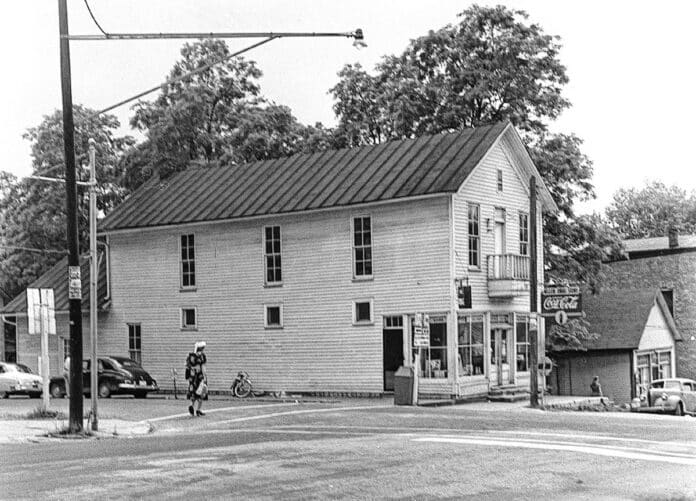
Submitter’s note: This is the second part of “How the Miller Drug Store came to Nashville, Indiana.” Next time (in two weeks) we will share part three, the last part, “The family moves to Nashville,” of the Miller family story with you. This comes from an unsigned story in “Brown County Remembers.”
The Miller family had known for some time prior to the year 1925 that the oldest child, Charles, would be the first of us four children to graduate from the eighth grade, or common school, as it was known.
The little town of Cross Plains in Ripley County in Southern Indiana, where our father had been proprietor of the only drug store since 1899, and our grandfather was a practicing physician, had no high school. It was obvious that if any or all of us children were to further our education beyond the eighth grade, as our parents had intended, someone would have to drive the nine miles to the nearest high school a Versailles, or that we as a family would have to relocate.
Our parents chose the latter course, knowing that in all likelihood the grandparents would follow, thus leaving a sizeable void in the little crossroads community.
Dad, as we called him, had heard through the grapevine of two drug stores for sale in the Indiana towns of Plainfield and Brownsburg, both of which had good high schools. Not being so confined to his business as he was destined to be in later years, he set out one day in his Buick touring car to investigate the two stores he had heard about. Why we didn’t wind up in Plainfield or Brownsburg, we were never told, but Dad’s search for a drug store did not end there.
Having heard of Brown County as a scenic area, as thousands have since, and being not far out of the way, the traveler decided to return to Cross Plains through the hill country, in spite of the additional time it would require.
Arriving in the town of Nashville, he stopped in the corner drug store for a bit of refreshment and an opportunity to relax somewhat before continuing the return trip.
Ola Vawter, widow of the late Charles Genolin, was the owner of the store, having inherited it upon her husband’s death. She had later married Will Vawter, the artist, but being a pharmacist in her own right, she had kept the store in operation.
It was Mrs. Vawter who approached Dad at the soda fountain, and after setting before him the nickel Coke that he requested, struck up a conversation. One must remember, in 1925, tourists had not begun their great influx upon Nashville and Brown County.
“Where are you from?” Mrs. Vawter asked. “Ripley County — Cross Plains,” Dad replied. “You don’t know anyone there that wants to buy a drug store, do you?” “Well I might. Is this one for sale?”
“You’re not a druggist, are you?” Mrs. Vawter continued her probe. It was both a proper and a leading question. Proper, because Dad bore little resemblance to being a professional person; leading, because it got right to the point.
It had been obvious from the very greeting that Mrs. Vawter wanted to sell the store, and by the time the last question was asked, Dad could hardly conceal the fact that he was in the market for one. The price must have been right, or nearly so, for the marriage between the Miller family and the drug business in Nashville was then and there consummated over a five-cent Coke.
It would be a blessing if all detours in life could end with the same good fortune that one through Brown County ended with that day. Not only did the young Millers have a good high school to attend, but Dad was provided a lovely spot in which to practice his profession.
As I look back on that transaction in 1925 and all that has transpired since, I am confident that someone besides my Dad steered that touring car through the hills of Brown County on that trip.
Submitted by Pauline Hoover, Brown County Historical Society




